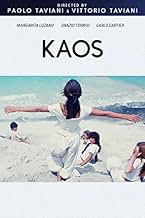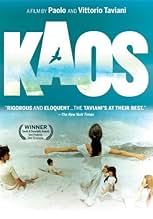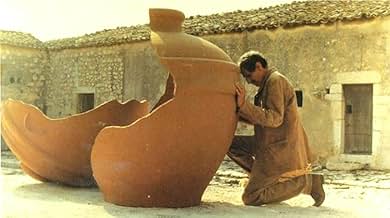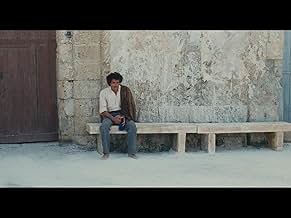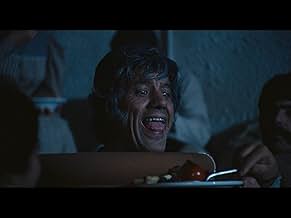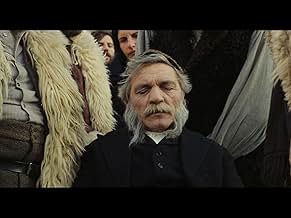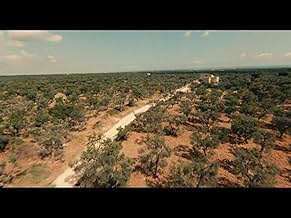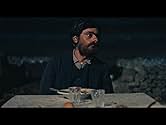AVALIAÇÃO DA IMDb
7,8/10
3,3 mil
SUA AVALIAÇÃO
Adicionar um enredo no seu idiomaFive stories by Luigi Pirandello set in turn-of-the-century Italy.Five stories by Luigi Pirandello set in turn-of-the-century Italy.Five stories by Luigi Pirandello set in turn-of-the-century Italy.
- Direção
- Roteiristas
- Artistas
- Prêmios
- 4 vitórias e 8 indicações no total
Regina Bianchi
- Madre di Pirandello (segment "Colloquio con la madre")
- (as Régina Bianchi)
Avaliações em destaque
The Taviani Brothers evoke the mystery, drama, and stark beauty of Sicily in this wondrous three-hour film, with its four earthy stories and sublime epilogue. In "The Other Son" a demented Sicilian mother (Margarita Lozano) longs to hear from her sons who have emigrated to American and forgotten her,. Memories of a traumatic rape experience as a young woman prevent her from being able to accept the love of her only devoted son who follows her around with his cows. "Moon Sickness" tells about a young bride who discovers that her husband likes to howl at the full moon. She is not without an erotic moonsickness of her own which makes her crave sex wit her cousin when the husband is unable to perform his marital duties. "The Jar" features comedians Franco Franchi and Ciccio Ingrassia in a classic comic narrative about a mean landowner's large broken olive jar and the jar-mender who gets trapped inside and their ensuing battle of wits. "Requiem" deals with rural shepherds who want to have a graveyard to bury thir dead. In the epilogue "Conversation with Mother", we see playwright/storyteller Luigi Pirandello returning to his native Sicilian town after years of success on the mainland. He encounters the spirit of his mother who recounts a fabulous fairy-tale journey taken when she had been a child. It is a stunning twenty-minute sequence that must surely rank with the best moments in the history of Italian cinema. The images of the children rolling down the mountain of pumice on the "Pumice Island" are of a poetic lyric intensity. The shot of Pirandello sitting silently in the chair that no longer contains the mother he had been speaking to is also utterly moving. Nicola Piovani's passionate and transporting musical score (he would later do the music for LIFE IS BEAUTIFUL)adds immeasurably to the the experience of this powerful work of art.
I saw Kaos, yesterday evening with friends who didn't know it or don't remember it. At this time, Italian cinema produces masterpieces. The emotional power acts after years, specially during the "novel" ends this movie, when Pirandello : at his top, comes back into the family house, re-open it, sees again, the only women he loves and remembers his trip, his family, his feelings : the splendor of childhood, the wildness of this isle, the warm of being protected & loved by his entire family in dramatic circumstances... Well : the music was written by Mozart himself. The beginning of this part is a kind of "Sergio Leone period : once upon in time..." a western like "I"m back" without guns and an harmonica. No action, but only emotion which grows again & again My POW ? A very great movie upon Sicilia, Mens, Women, family, land... See by two directors who knows emotion in movies are more important than 3D effects... God (Ford & Griffith) bless them Sorry my American & English are poor, but I'm just a french guy. See this movie and enjoy it (don't forget a bunch of Kleenex) you will never see that again.
Kaos is one obvious masterpiece of the Taviani brothers. Unfortunately I can not explain the title. But I don't think there is a clear explanation or important message in any of the stories either, in contrast with Kobayashi's Kwaidan (1964), which consists clearly of four stories about ghosts. Kaos seems to deal with family or legacy in general. There are five fairy-tales from Luigi Pirandello about ordinary people and the curious small worlds (or illusions) they find themselves in. I'm not going to reveal exactly what happens in the stories. It's just fantastic and a little nostalgic to watch the strange events and behaviour of different people for three hours without fancy special FX. Credit to cinematographer Giuseppe Lanci (Nostalghia, 1983) and composer Nicola Piovani of course, who did a surpassing job. The performances of the actors are great and never overdone. That wouldn't be appropriate for such a sober work of cinema that could have taken place 200 years ago. It may be not an important film, but it IS unforgettable, timeless and will become one of your personal favourites.
10 points out of 10 :-)
10 points out of 10 :-)
"Kaos" (Italian, 1984): Told are five stories, separate but woven together by location (an incredible, ancient, crumbling, sun bleached land) and other unique poetic devices. They are told over 188 minutes. I suggest a short break after each story. They are all unique. Each has separate value, and is worth absorbing. Directed by Paolo & Vittorio Taviani. These unsentimental folk tales are loaded with humanity's weakness, strength, silliness, pettiness, and plenty of important symbolic lessons ALWAYS worth chewing on. When our Old People aren't there to pass along these lessons, at least we have the film makers. The screen is our fire. The seats are our logs. The film team is our story teller. The darkened room is our night.
Which, unfortunately is impossible for three hours. I've seen it two times in the cinema. The characters are so good, and are given all the time and space to develop starting with MariaGrazia. I really can't think of a movie that's made with more love and dedication. La Giara is a rare but welcome break and watch how Franchi and Ingrassia interact, watch the beauty of baby Bata's eyes in Mal di Luna. Just find out all those details and you won't be disappointed. Having seen Italy after watching KAOS was a feast of recognition, it's really like that, the villages where time stands still, the people, go and see it and you won't be disappointed.
Você sabia?
- CuriosidadesThe title of the movie comes from a quote of Luigi Pirandello, the author of the book the movies is based on. Pirandello used to say to be a "son of chaos", since he was born in Càvusu, a small village, whose name came from the Greek "Kàos", "chaos".
- Versões alternativasTheatrical release in Italy did not include the segment "Requiem".
- ConexõesEdited into Bellissimo: Immagini del cinema italiano (1985)
Principais escolhas
Faça login para avaliar e ver a lista de recomendações personalizadas
- How long is Kaos?Fornecido pela Alexa
Detalhes
Bilheteria
- Faturamento bruto nos EUA e Canadá
- US$ 325.717
- Fim de semana de estreia nos EUA e Canadá
- US$ 11.412
- 17 de fev. de 1986
- Tempo de duração3 horas 7 minutos
- Mixagem de som
- Proporção
- 1.85 : 1
Contribua para esta página
Sugerir uma alteração ou adicionar conteúdo ausente




